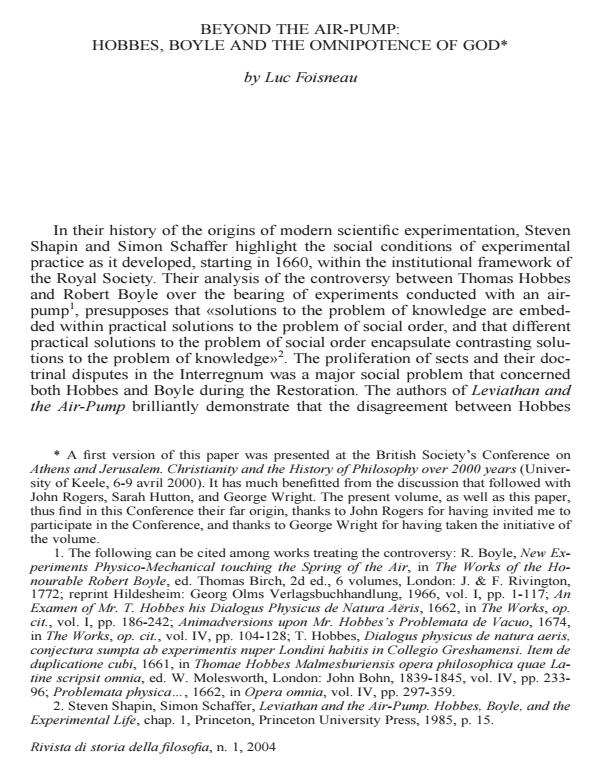Beyond the air-pump: Hobbes, boyle and the omnipotence of god
Titolo Rivista RIVISTA DI STORIA DELLA FILOSOFIA
Autori/Curatori Luc Foisneau
Anno di pubblicazione 2004 Fascicolo 2004/1
Lingua Inglese Numero pagine 17 P. Dimensione file 71 KB
DOI
Il DOI è il codice a barre della proprietà intellettuale: per saperne di più
clicca qui
Qui sotto puoi vedere in anteprima la prima pagina di questo articolo.
Se questo articolo ti interessa, lo puoi acquistare (e scaricare in formato pdf) seguendo le facili indicazioni per acquistare il download credit. Acquista Download Credits per scaricare questo Articolo in formato PDF

FrancoAngeli è membro della Publishers International Linking Association, Inc (PILA)associazione indipendente e non profit per facilitare (attraverso i servizi tecnologici implementati da CrossRef.org) l’accesso degli studiosi ai contenuti digitali nelle pubblicazioni professionali e scientifiche
Beyond the Air-pump: Hobbes, Boyle and the Omnipotence of God (by Luc Foisneau) - ABSTRACT: In a response that is both appreciative and critical, Luc Foisneau addresses several questions raised by the well-known work of Steven Shapin and Simon Shaeffer, Hobbes and the Air-Pump (Princeton, NJ: Princeton University Press, 1985). Foisneau shows that the dispute between Hobbes and Robert Boyle stemmed not only from social or epistemological matters but also from divergent interpretations of the status of religion and theology. Insisting on the importance of Hobbes’s theory of natural religion, the author links the concept of omnipotence, as Hobbes develops it, to the natural obligation to obey the laws of nature. Nonetheless, the figure of the almighty God who rules over humanity through fear of death is only indirectly rooted in the science of nature, and it is here that Foisneau marks a key difference between Hobbes and Boyle, for whom experimental science could provide a naturalistic re-founding of Christian theology. Reverting to Cartesian arguments regarding the immortality of the soul and divine providence, Boyle believed that experiments obliged the mind of the researcher to witness to God’s transcendence and government of the world. Thus disposed by the new science, the scientist naturally becomes Christian.
Luc Foisneau, Beyond the air-pump: Hobbes, boyle and the omnipotence of god in "RIVISTA DI STORIA DELLA FILOSOFIA" 1/2004, pp , DOI: